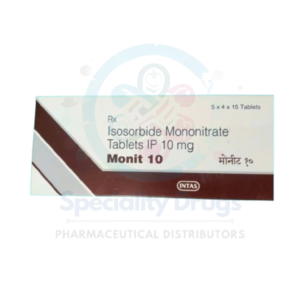What is Chlorpromazine Tablets I.P.?
Chlorpromazine Tablets I.P. contain Chlorpromazine Hydrochloride, a first-generation antipsychotic belonging to the phenothiazine class. It acts on the central nervous system to help restore chemical balance in the brain and is primarily used to treat psychiatric and neurological disorders.
These tablets are prescription-only medicines and are usually taken orally under the supervision of a healthcare provider.
What is the Use of Chlorpromazine Tablets I.P.?
Chlorpromazine Tablets I.P. are used to treat a variety of mental and emotional conditions, including:
-
Schizophrenia
-
Psychotic disorders
-
Severe anxiety or agitation
-
Mania in bipolar disorder
-
Nausea and vomiting (in select cases)
-
Hiccups that are resistant to other treatments
-
Tetanus and porphyria (as an adjunct therapy)
Benefits of Chlorpromazine Tablets I.P.
-
Effective Antipsychotic: Helps manage symptoms of schizophrenia and other psychoses.
-
Mood Stabilization: Reduces agitation, aggression, and severe anxiety.
-
Multi-purpose Use: Can be used in treatment of intractable hiccups, nausea, and certain neurological conditions.
-
Proven History: One of the oldest and most well-researched antipsychotics with known efficacy.
Side Effects of Chlorpromazine Tablets I.P.
Like all medications, Chlorpromazine may cause side effects. Some are common and mild, while others can be more serious and require medical attention.
Common Side Effects:
-
Drowsiness or sedation
-
Dry mouth
-
Constipation
-
Blurred vision
-
Dizziness or low blood pressure
-
Weight gain
Serious Side Effects:
-
Extrapyramidal symptoms (tremors, muscle stiffness, restlessness)
-
Tardive dyskinesia (involuntary movements)
-
Neuroleptic malignant syndrome (a rare but life-threatening condition)
-
Jaundice or liver function abnormalities
-
Blood disorders (e.g., agranulocytosis)
Always inform your healthcare provider about any unusual or severe symptoms while using this medication.
Precautions and Warnings
-
Avoid alcohol and sedative drugs while taking Chlorpromazine.
-
Use with caution in patients with liver or heart disease, Parkinson’s disease, or a history of seizures.
-
May cause drowsiness—avoid driving or operating heavy machinery.
-
Not recommended during pregnancy or breastfeeding unless prescribed.
-
Long-term use requires regular monitoring for movement disorders and blood counts.
-
What is Chlorpromazine Tablets I.P.?
Chlorpromazine Tablets I.P. are prescription medications that contain chlorpromazine, a typical antipsychotic used to manage various psychiatric and behavioral disorders. -
What are the uses of Chlorpromazine Tablets?
They are used to treat conditions such as schizophrenia, manic episodes of bipolar disorder, severe anxiety, nausea and vomiting, and sometimes intractable hiccups or acute intermittent porphyria. -
How does Chlorpromazine work?
Chlorpromazine works by blocking dopamine receptors in the brain, helping to balance neurotransmitters and reduce psychotic symptoms like hallucinations, delusions, and agitation. -
What is the usual dosage of Chlorpromazine Tablets I.P.?
The dosage varies depending on the condition being treated, patient age, and response to therapy. It must be prescribed and adjusted by a healthcare professional. -
Can Chlorpromazine be used in children?
Yes, but only under strict medical supervision. Dosage adjustments are required based on age and weight. -
What are the common side effects of Chlorpromazine?
Common side effects include drowsiness, dry mouth, constipation, blurred vision, dizziness, and weight gain. -
Are there serious side effects to watch out for?
Yes. Rare but serious effects include tardive dyskinesia (involuntary movements), neuroleptic malignant syndrome, severe low blood pressure, and blood disorders. -
Can I stop taking Chlorpromazine suddenly?
No. Stopping suddenly can lead to withdrawal symptoms or worsening of your condition. Always follow your doctor’s guidance when stopping or adjusting the dose. -
Does Chlorpromazine cause drowsiness?
Yes, drowsiness is a common side effect. Avoid driving or operating heavy machinery until you know how it affects you. -
Can Chlorpromazine be used to treat anxiety?
Yes, it can be used short-term for severe anxiety, usually when other treatments are not effective, but it is not a first-line treatment for general anxiety disorders. -
Is Chlorpromazine habit-forming?
No, it is not considered addictive, but misuse or abrupt withdrawal should be avoided. -
Can I take alcohol while on Chlorpromazine?
No. Alcohol increases the sedative effects of Chlorpromazine and may lead to dangerous side effects like severe drowsiness, low blood pressure, or breathing problems. -
Can Chlorpromazine be used during pregnancy?
It should only be used during pregnancy if clearly needed and prescribed by a doctor. Inform your healthcare provider if you are pregnant or planning to conceive. -
Are there any drug interactions with Chlorpromazine?
Yes. It may interact with antidepressants, antihistamines, anti-seizure medications, blood pressure drugs, and others. Always inform your doctor about all medications you are taking. -
How should Chlorpromazine Tablets I.P. be stored?
Store at room temperature, away from moisture, heat, and light. Keep out of reach of children.






Reviews
There are no reviews yet.